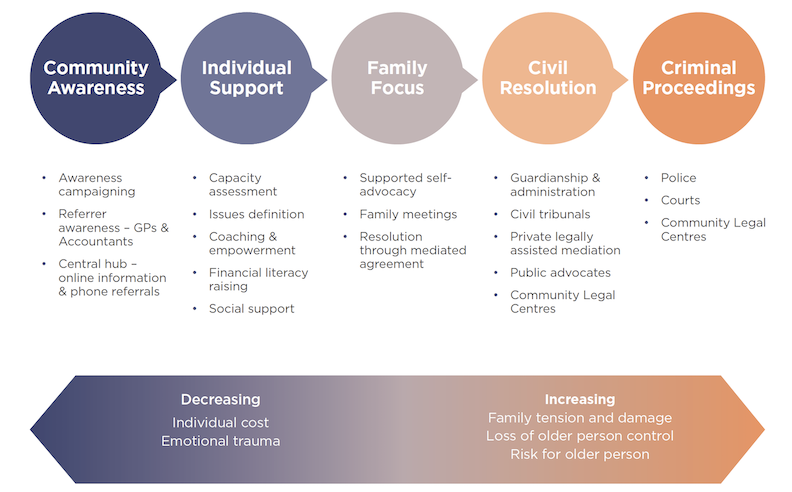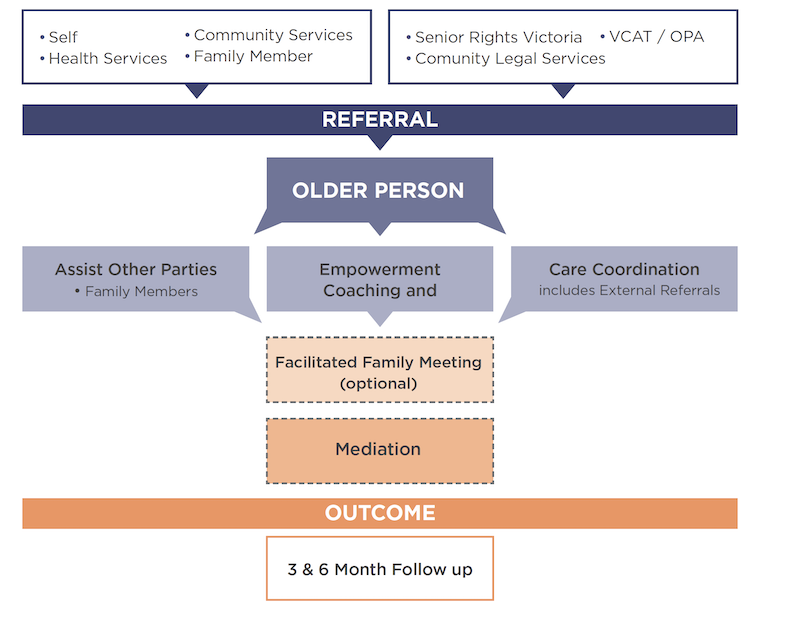Download the Financial hardships research report.
Please enter your email to download the full report. We will protect your data per our Privacy Policy.
This discussion paper reports on the experience and practice observations of Better Place Australia in responding to elder abuse through the Respecting Elders service in 2017-18. Elder abuse may take the form of neglect, psychological, social, financial, physical, or sexual abuse. Elder abuse continues to be hidden within families or institutions and thus, it is difficult to determine prevalence. Recent figures from the Australian Institute of Family Studies (2016) suggest that 2-10% of older Australians have experienced abuse.
The current service system responses (as represented below in figure 1) to responding to elder abuse, including primary prevention through raising community awareness, individual and family work, civil resolutions and criminal proceedings.
Currently, more attention and funding are directed towards civil and criminal resolutions, although the Victorian Department of Health and Human Services’ model of integrated care is shifting focus towards family and individual support. This is a positive step for the service system as it responds to what Better Place Australia have observed in our practice: that intervention at this level has resulted in clients experiencing less emotional and individual cost and avoiding escalation. Further supporting this finding is the fact that legal responses were only requested by 6% of the approximately 200 clients engaged with the service.

The drivers of elder abuse are complex and include gender, power and control, and ageism. The academic literature identifies several common risk factors for elder abuse, these include cognitive impairment or another disability, social isolation, history of trauma, care dependency, low income, interdependent relationship between parents and adult children and having a perpetrator who experiences depression or substance misuse.
Better Place Australia’s practice observations support these findings and additionally identify the following risk factors for elder abuse:
Barriers to seeking help for older people experiencing abuse include a lack of awareness and knowledge of support services, shame and, when the perpetrator is an adult child, not wanting their adult children to experience the consequences.
The Respecting Elders service is an integrated model of care that is based on the principles of empowerment and self-determination. The Respecting Elders service incorporates thorough intake and assessment where risk and capacity are the primary considerations and decisions regarding suitability for family meetings, mediation, counselling and financial counselling are made. The Respecting Elders service model is represented below in figure 2.

Better Place Australia concludes this discussion paper with seven considerations for the elder abuse service system:
This discussion paper provides beginning insights into Better Place Australia’s Respecting Elders service and the drivers, risk factors and barriers to help seeking for elder abuse. Additionally, this discussion paper presents directions for future research, policy and practice based on our practice observations and experience in this emerging field.
Australian Institute of Family Studies 2016, Elder abuse: Understanding issues, frameworks and responses, viewed 28 October 2019, https://aifs.gov.au/publications/elder-abuse